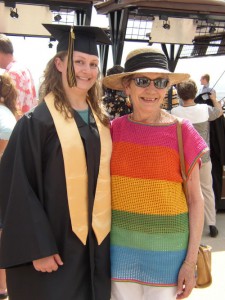
Women surpass men in college degree achievement. In 2012, women earned more than half of bachelor’s, master’s, and doctorate degrees. While there is a clear difference between men and women’s college educational achievement, it is less clear what role sexual identity plays in addition to gender in degree attainment. In other words, do all women achieve more degrees than men, or does this difference change depending on men and women’s sexual identities?
Leigh Fine uses data from the National Longitudinal Study on Adolescent Health to explore how likely individuals are to attain a bachelor’s degree depending on their gender and self-identified sexual identity. Fine’s research counters work that shows there is a “female advantage” and an “LGB bonus” in degree attainment. Following previous research, Fine shows heterosexual women are more likely to attain bachelor’s degrees than heterosexual men. However, he finds that gay and bisexual men have the greatest probability of earning bachelor’s degrees over all gender and sexual identity combinations. On the other hand, lesbian and bisexual women have the smallest probability of doing so. Sexual minority men thus are granted a bonus in degree attainment, while sexual minority women receive a penalty.
Fine’s objective was to document the differences in educational attainment by gender and sexual identity, and he calls on future researchers to investigate explanations for these differences. Fine’s research and other recent studies importantly draw attention to intersectionality, specifically how sexuality interacts with other identities. To really understand differences in educational attainment, future research must take multiple identities into account.
Read the full article here:
Fine, Leigh E. 2015. “Penalized or Privileged? Sexual Identity, Gender, and Postsecondary Educational Attainment.” American Journal of Education 121(2): 271-297.
Allison Nobles is a graduate student in Sociology at the University of Minnesota who studies gender, sexuality, and violence. Follow me on Twitter @Allison_Nobles.
Read more about intersectional effects: Caty Taborda Cites a recent study showing that gay black men may be more likely to land jobs and higher salaries than straight black men.




Comments 2
Research More Women Graduating Than Men and More | LANDsds Sustainable Voice -The NeXuses — June 5, 2015
[…] H/t to Education and Society. […]
Women Graduate College at Higher Rates Than Men Unless They’re Gay | — July 7, 2015
[…] H/t to Education and Society. […]